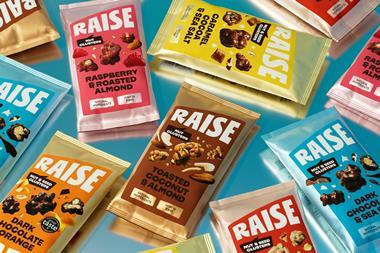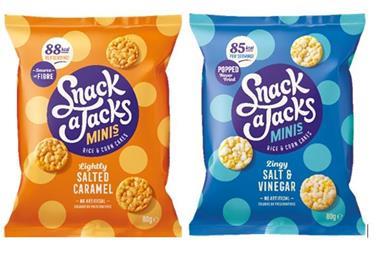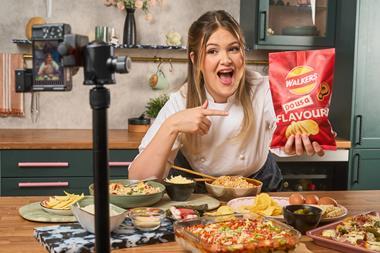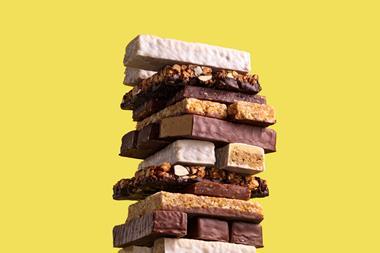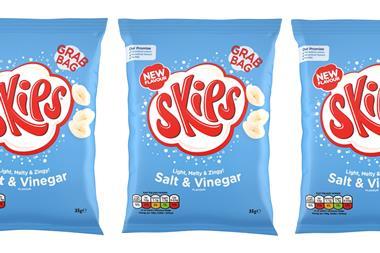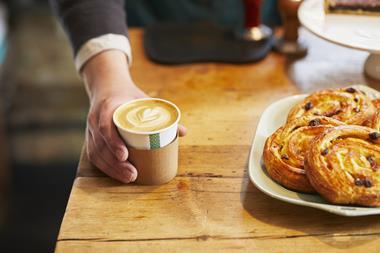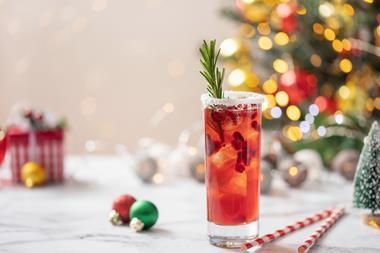Last year Which? magazine ran a report about the sky-high prices of afternoon tea. Apparently, there’s been a surge in popularity of ‘taking’ afternoon tea in hotels, but some London establishments are charging up to £85 per person for the privilege. Unfortunately, in everyday life, afternoon tea has virtually disappeared - the nearest most people come is watching it on TV in Downton Abbey.
47%
That’s the share of cake sales that come from branded lines, according to Mintel
However, tea (and coffee) and cake (and biscuits) are still very much enjoyed by UK consumers, just not at any set time. They are more likely to be consumed during the course of the day - on-the-go, at a break or as a treat.
When it comes to tea, IRI data to October 27, 2012 reveals that sales of ordinary tea bags in c-stores are down 2.6% on the previous year, in line with the total market.
However, Helen Cameron, customer marketing manager at Typhoo Tea, says that the average price per kilo of tea sold in c-stores is now 20% higher: “The shift in market averages reflects the trend towards deeper discounts on larger packs in the major mults. But in the convenience channel, deals on larger packs can lead to stockpiling and affect the frequency of visit and overall footfall. A minimum credible range should include pack sizes and brands to cover all price points to remain competitive.”
When it comes to brands, Taylors of Harrogate convenience channel controller John Sutcliffe says Yorkshire Tea continues to outperform the total tea market and is now the number three brand in the category. And although the brand’s heartland remains in the North, the tea now has broad national distribution.
“The convenience channel is strategically important to us and we ensure that we support retailers with strong promotional activity such as by offering our pricemarked and extra-fill packs,” says Sutcliffe.
Market update
The ageing population is good news for both the biscuits and cakes markets. Research company Mintel expects the sweet biscuits market to grow by 21% to £1.7bn by 2016 - driven by higher ingredients costs and a rise in over-65s, who are key biscuit eaters, consuming them at least once a day. The most popular biscuits are ‘sweet everyday’ ones such as digestives, custard creams and bourbons, owing to their competitive prices.
While usage levels of cakes steadily decrease with age, the portion of heavy users jumps dramatically among over-45s and particularly over-65s, with 27% of cake users in the over-65 age group eating cakes two or three times a week.
According to Mintel, 83% of adult snackers classify sweet biscuits as an ‘indulgent treat’. And, despite the drives to encourage healthy eating, nearly half of adults (47%) like to treat themselves to unhealthy foods, whereas only one in four adults is always on the lookout for light versions of food and drink.
In the main, small, affordable treats such as biscuits or chocolate have seen good sales during the recession. However, consumers do seem to have cut back on cakes. The market saw sales fall in both 2010 and 2011, but Mintel says there are now signs that the market has reached its lowest point and has ‘turned a corner’. The company expects the cakes and cake bars market to continue taking “tentative steps on the road to recovery in the coming years, showing slow annual growth to reach £1.25bn by 2017”.
Like the biscuits category, cakes has strong competition from confectionery and salty snacks but there’s also the threat from the rise in popularity in home baking.
Cameron points out that the growth in fruit and herbal teas (up 3% year on year, IRI) and green tea (up 9% year on year) reflects the trend for shoppers to broaden their tea repertoire, particularly in those small stores operated by the major mults.
“European discounters also stock a range of fruit and herbal and green tea and the high street discounters positioned about 99p or £1 often have ‘when it’s gone, it’s gone’ promotions on these lines.
“C-stores should consider peppermint, chamomile and lemon & ginger 20s at competitive price points to help defend themselves against the discounters and the major mults’ small formats.”
Simon Attfield, customer marketing controller for Tata Global Beverages, says the new year is a key time for sales of healthier green teas. “Last year our Tetley brand had the highest response ever to a concentrated marketing programme and sales of its green teas increased dramatically over this period. There will be a similar drive this year.”
He says Tetley has the top two-selling green SKUs in the market overall (Tetley Pure 50s and Tetley Green 50s), which are growing year on year by 8% and 5% respectively (Nielsen figures). Attfield adds: “Many convenience store owners are failing to realise the potential of high-value green tea sales and either don’t stock it or stock the wrong products.”
Retailer’s view
“We have one long aisle with tea and coffee at the start (and sugar underneath) followed by biscuits, then cake, then bread.
“Sales are fairly steady across the categories because they are everyday lines. With tea and coffee, my customers stick to what they like so some buy the more expensive brands and some go for the cheaper ones. I do go for pricemarked packs on tea and coffee and the margins seem to be fair on these.
“We’ve just got a new range of Happy Shopper cakes and biscuits at ‘2 for £1’, and people love those. My customers only really buy McVitie’s if they are on offer. I’ve an excellent offer at the moment of McVitie’s biscuits that are usually priced at £1.85, pricemarked at just 89p.”
Sarbjit Daley, Sarbs Convenience Store, Wolverhampton
He suggests retailers go for Tetley’s packs of pure green and lemon green 20s pricemarked at £1.
Typhoo’s Cameron recommends merchandising smaller packs of tea close to the milk chiller to help capitalise on the natural affinity between hot beverages and milk. “Typhoo Eco refill 40s are available in space efficient, shelf-ready packaging to enable c-stores to test them at different fixtures in the store. In particular, the colourful outer with £1 pricemark flash would prompt shoppers to pick up a pack on impulse.”
Despite consumers’ supposed preference for fancy barista-style coffees, 77% of all coffee drunk at home is from the everyday segment (IRI data), where Nescafé Original is king, as the UK’s number one soluble brand.
According to Nestlé UK trade communications manager Graham Walker, attracting younger consumers remains a big opportunity in the coffee market. To this end, Nestlé launched Nescafé Original 3in1 (coffee, whitener and sweetener) and 2in1 (coffee and whitener). Five new sachet formats were introduced across both brands last year, specifically for convenience-type stores.
Says Walker: “The £1 pricemarked packs aim to attract younger consumers to the soluble coffee category with a ‘hassle-free’ ready-mixed format and great tasting coffee in seconds, while offering consumers convenience and value for money.”
The launches have been deemed a success, after accruing incremental sales for the Nescafé master brand.
On to hot chocolate and, interestingly, the home-baking boom has been a boon for Cadbury Cocoa. Its sales have grown by 38.4% (AC Nielsen stats) and brand owner Mondelez puts much of this growth down to its use as a baking ingredient.
Taking the biscuit
“Tea and biscuits have a natural affinity, and even promoting two ‘everyday’ products on a round-pound deal offers an affordable treat for the shopper and builds the average transaction value in c-stores,” says Typhoo’s Cameron. He recommends cross-category promotions, but adds that they need to be easy for the retailer to execute and simple for the shopper to understand.
According to Mintel, own label accounts for 78% of sweet biscuit sales. But one biscuit brand that’s still a favourite is McVitie’s chocolate digestives which, according to Nielsen data, is the number one selling pricemarked biscuit in convenience stores.
This month the biscuits are getting even better with more chocolate being added to the milk and dark variants. The improved products will be available in 300g and 400g roll-wrap packs. Rrp is £2.49 and £2.89 respectively, but a £1.85 300g pricemarked pack will also be available.
And from February there is even more exciting news for Digestives’ fans as new McVitie’s double chocolate digestives (chocolate-flavoured biscuit containing chocolate chips and half coated in milk chocolate) will be launched. Brand owner UB says the new product will provide consumers with an “indulgent everyday biscuit that will drive growth into the everyday treat segment of the category”. The biscuits will be available in a 300g roll wrap pack with a rrp of £1.75.
McVitie’s chocolate digestives will be on TV in February for the first time since 2008 as part of a £2.2m marketing campaign, which also includes in-store sampling.
Burton’s Biscuit Company has reached a milestone, taking a 10% share of the sweet biscuit category (IRI). The company says Cadbury Fabulous Fingers has become a £5m brand in less than a year and, what’s more, has had a halo effect on the Fingers brand, which has grown by 14% (IRI).
The Maryland brand is enjoying growth, too - up 14.8% year on year. It has a 53% share of the branded cookies category with both Maryland (up 6%) and Maryland Big & Chunky (up 136%) contributing to this growth (IRI).
Dodgers is also in growth, as is Wagon Wheels, thanks to its relaunch. It is now a £15m brand with sales up 51% year on year, according to IRI.
While some consumers like to indulge in a choccy biscuit as a treat, there are others who are looking for healthier options.
Ones to watch
Just desserts
Premier Foods is hoping to tickle the nation’s sweet tooth with the launch of Mr Kipling Dessert Classics. The range consists of two types of cake inspired by dessert favourites banoffee pie and Mississippi mud pie. Banoffee slices come in a snap-pack format which can be used in lunchboxes, while the mud pies come in boxes of six.
rrp: £1.49
tel: 01727 815850
Virtuous cycle
The Kenco Rewards Club aims to give something back to its loyal drinkers. Consumers collect points with every pack of Kenco purchased and can then exchange them for rewards at mykenco.com. Each reward has been chosen with the environment in mind, including an ‘eco’ kettle, Jamie Oliver recycled glasses, Kenco Terracycle bag and Jamie Oliver herb pots.
tel: 01895 615000
Choco treats
Last year Bahlsen relaunched its flagship Choco Leibniz brand in a bid to strengthen its position in the special treats segment. The brand was given a contemporary new look and made a long term commitment to sustainable cocoa cultivation. The range includes dark chocolate, milk chocolate, orange milk chocolate and double chocolate vairants.
rrp: £1.89
tel: 01753 889822
Price points
Tapping into the consumer trend for visible value for money, McVitie’s Cake Co is the latest manufacturer to launch a range of £1.49 pricemarked packs. The PMPs are available for six months and the range includes popular favourites such as Mars Cake bars, Galaxy Cake Bars, Jaffa Cakes Cake Bars and Jamaica Ginger and Lyon’s Golden Syrup Whole Cakes.
tel: 020 8234 5000
UB has had great success with its Go Ahead! range. UBUK marketing director Jon Eggleton explains: “Go Ahead! has continued to evolve and remain relevant to a very loyal fan base, while attracting new buyers. In fact, it has the highest repeat purchase rate in the healthier biscuit segment of 57% (Nielsen/Kantar Worldpanel) thanks to the brand’s better-for-you credentials that don’t compromise on taste. Healthier eating has moved on from the days of dieting and guilt to responsible enjoyment and we have responded to this with the introduction of NPD such as Go Ahead! Chocolate Thins.”
The aforementioned Chocolate Thins are light crispy biscuit slices covered by a milk chocolate topping. They were launched last year and are already worth £3m. With sales like that, it should come as no surprise, then, that UBUK is extending the range to include a new forest fruits variant.
Also this month, UBUK is extending its Go Ahead! crispy fruit slices range to include a strawberry flavour.
Eggleton says the new launches tap into the ‘healthy choices’ snacking occasion and will be supported by the return of the Go Ahead! ‘guru’ ad this month as part of a £1.3m marketing campaign for 2013.
McVitie’s Cake Company holds the largest branded share of the ‘eat now’ cake market at 19% (Nielsen) and is backed by a number of strong branded products including McVitie’s Snickers Flapjacks (third best-seller), McVitie’s Galaxy Muffin (fourth best-seller), McVitie’s HobNob Chocolate Flapjacks (fifth) and McVitie’s Oat & Syrup Flapjacks (eighth).
The firm is building on the success of the ‘slices’ segment with two new variants: McVitie’s Digestive Slice and McVitie’s GingerNut Slice.
Currently worth £128m and up by 6% year on year (Nielsen), the slices segment presents retailers with a great sales opportunity, according to UB. McVitie’s Cake Company marketing controller David Fowler comments: “With the continued growth of the slices segment within the cake category and the success already enjoyed by the Twix Slice and the Galaxy Cookie Crumble Slices, which are worth almost £8m combined in less than a year, it was a natural progression to extend the range to include leading McVitie’s brands.
“It is clear that the biscuit slices niche is growing in popularity, so we’re confident that the McVitie’s Digestives Slices and McVitie’s GingerNuts Slices will help fuel sales for retailers.”
Source
Tracy West





















